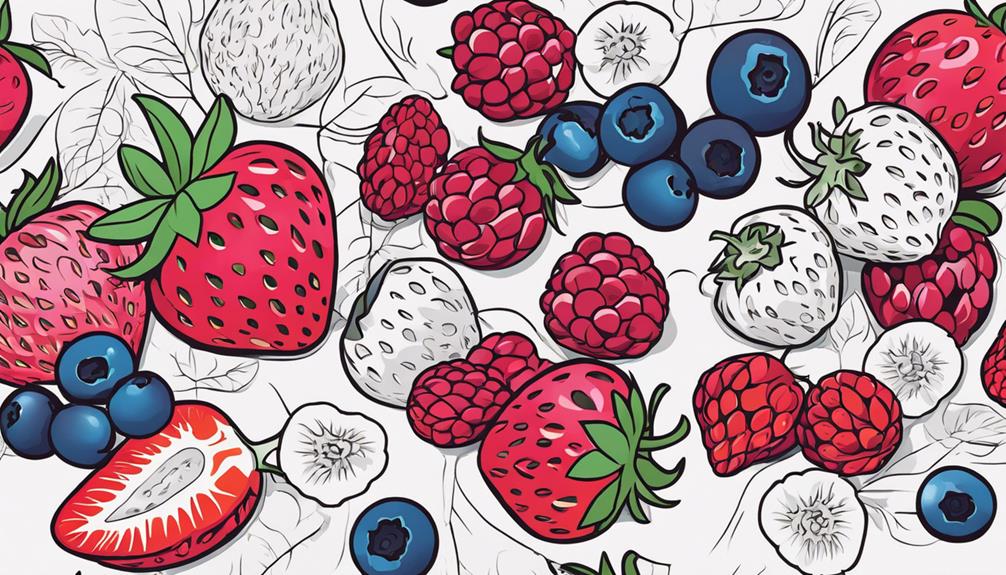Are you looking for ways to manage your blood sugar levels effectively while still enjoying delicious meals?
Discover the top low glycemic foods that can help you maintain optimal diabetic health. From creamy avocados to nutrient-packed quinoa and vibrant berries, incorporating these foods into your diet can offer a range of benefits.
But what makes these foods so beneficial for diabetic individuals?
Stay tuned to uncover the secrets behind these low glycemic wonders and take charge of your health with every bite.
Key Takeaways
- Including avocados, quinoa, berries, legumes, and sweet potatoes in diet aids in optimal diabetic health.
- These low glycemic foods help control blood sugar levels and provide essential nutrients.
- Consumption supports blood sugar control, offers health benefits, and aids in overall well-being.
- Variety of nutrient-rich options like avocados, quinoa, berries, legumes, and sweet potatoes is beneficial.
Avocados

When managing diabetes, incorporating avocados into your diet can be a beneficial choice due to their low glycemic index and healthy fat content. Avocados are packed with essential nutrients such as fiber, potassium, and monounsaturated fats, making them an excellent option for stabilizing blood sugar levels. The healthy fats in avocados can help improve insulin sensitivity, which is crucial for individuals with diabetes.
Nutritional benefits of avocados include being rich in fiber, which aids in digestion and helps control blood sugar levels. They also contain potassium, which is important for heart health and regulating blood pressure. The monounsaturated fats in avocados are beneficial for reducing inflammation and lowering the risk of heart disease.
For meal ideas, consider adding avocado slices to salads, sandwiches, or wraps for a creamy texture and satisfying taste. You can also mash avocados and spread them on whole grain toast as a nutritious breakfast option. Get creative with avocado smoothies by blending them with leafy greens, fruits, and a source of protein like Greek yogurt for a balanced meal.
Quinoa
Incorporate quinoa into your diabetic diet to benefit from its low glycemic index and high nutritional value, providing essential nutrients for managing blood sugar levels effectively. Quinoa is a nutrient-dense whole grain that offers various health benefits. Its low glycemic index helps in stabilizing blood sugar levels, making it a great choice for individuals with diabetes. Quinoa is rich in fiber, protein, vitamins, and minerals such as magnesium, iron, and zinc, which are crucial for overall health and well-being.
When it comes to cooking methods, quinoa is versatile and easy to prepare. You can cook it on the stovetop by simmering it in water or broth until the grains are fluffy. Additionally, quinoa can be used in salads, soups, or even enjoyed as a breakfast porridge. Experiment with different spices and herbs to enhance its flavor profile while keeping your meals exciting and nutritious. By incorporating quinoa into your diet, you can enjoy its health benefits while managing your blood sugar levels effectively.
Berries

Berries are nutrient-rich fruits that offer numerous health benefits, including being a great addition to a diabetic diet due to their low glycemic index and high antioxidant content. When it comes to managing blood sugar levels, berries are an excellent choice due to their slow impact on blood glucose. The antioxidants found in berries, such as blueberries, strawberries, and raspberries, help reduce inflammation and protect cells from damage caused by free radicals.
Incorporating berries into your meal planning can be simple and delicious. Add a handful of berries to your morning oatmeal or yogurt, blend them into a smoothie, or enjoy them as a snack on their own. Their natural sweetness can satisfy your cravings for something sweet without causing a rapid spike in blood sugar levels.
Legumes
Legumes, such as beans and lentils, are highly recommended for individuals looking to maintain stable blood sugar levels due to their low glycemic index and high fiber content. Incorporating legumes into your diet can have significant benefits for blood sugar management. Here are some reasons why legumes are a great addition to your diabetic-friendly meal plan:
- Fiber Benefits: Legumes are rich in fiber, which can help slow down the absorption of sugar into the bloodstream, preventing spikes in blood sugar levels.
- Slow Digestion: The complex carbohydrates in legumes are digested slowly, providing a steady release of glucose into the bloodstream and avoiding sudden sugar spikes.
- Nutrient-Rich: Legumes are packed with essential nutrients like iron, potassium, and magnesium, which are important for overall health and well-being.
- Satiety: The combination of protein and fiber in legumes helps you feel full and satisfied, reducing the likelihood of overeating or reaching for unhealthy snacks.
Incorporating legumes into your meals can be a delicious and beneficial way to support your diabetic health goals.
Sweet Potatoes

For stable blood sugar management and a nutrient-rich diet, consider adding sweet potatoes to your meals. Sweet potatoes are an excellent choice for individuals looking to control their blood sugar levels while enjoying a delicious and versatile food option. These root vegetables have a lower glycemic index compared to regular potatoes, making them a suitable choice for diabetic individuals or anyone aiming to maintain steady blood sugar levels.
In addition to their low glycemic index, sweet potatoes offer a variety of health benefits. They're rich in fiber, vitamins A and C, and antioxidants, which can help boost your immune system and support overall well-being. Sweet potatoes also contain beta-carotene, which is beneficial for eye health.
Incorporating sweet potatoes into your diet is easy with a multitude of delicious recipes available. From savory options like roasted sweet potato wedges to sweet treats like sweet potato brownies, the possibilities are endless. Experiment with different preparations to find your favorite way to enjoy this nutritious and diabetic-friendly vegetable.
Frequently Asked Questions
Can Avocados Be Eaten in Unlimited Quantities for Diabetics?
You should practice portion control when eating avocados as they are nutritious but high in calories. Try avocado recipes like salads or smoothies to enjoy their benefits while managing your intake wisely.
Are There Any Specific Varieties of Quinoa That Are Better for Managing Blood Sugar Levels?
When managing blood sugar levels for optimal diabetic health, consider specific quinoa varieties. Quinoa's low glycemic index aids in blood sugar control. Incorporating quinoa into your diet can offer various health benefits, supporting your overall well-being.
How Do Different Types of Berries Compare in Terms of Their Glycemic Index Values?
When comparing different types of berries for glycemic index values, consider blueberries, strawberries, and raspberries. Blueberries are low-GI, packed with antioxidants. Strawberries have a lower GI than raspberries, both offering nutritional benefits and versatile culinary uses. Enjoy their distinct flavor profiles!
Is It Better to Consume Legumes in Their Whole Form or as Processed Products Like Tofu or Tempeh for Diabetics?
When it comes to legumes, stick to the whole deal. Whole legumes offer sustained energy and fiber, unlike processed forms. But if you fancy a twist, fermented legumes like tofu or tempeh can add gut-friendly benefits.
Are There Any Specific Cooking Methods for Sweet Potatoes That Can Help Maintain Their Low Glycemic Index?
To maintain sweet potatoes' low glycemic index, consider roasting with a light coating of olive oil or steaming with minimal water. These cooking methods help preserve nutrients. Include sweet potatoes in meal planning for a balanced diet.
Conclusion
In conclusion, incorporating low glycemic foods like avocados, quinoa, berries, legumes, and sweet potatoes into your diet can greatly benefit your diabetic health. These foods provide essential nutrients while helping to stabilize blood sugar levels.
So why not give your body the nourishment it deserves and make these delicious and nutritious options a regular part of your meal plan? Your health will thank you.